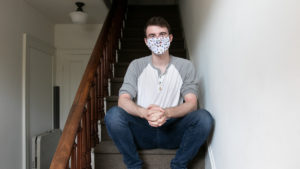Tension between South Hill residents and Ithaca College students is not new, and the COVID-19 pandemic has brought concerns about off-campus housing and parties to the forefront.
There are 2,025 students living off campus in Ithaca for Fall 2020, including 139 commuters, 517 graduate students, 13 freshmen, 91 sophomores, 429 juniors and 836 seniors, said Eileen Harrington Roth, off-campus living coordinator. There are 5,354 students enrolled in the college for the fall semester, meaning approximately 38% of the student body is living off-campus in Ithaca. This includes 1% of freshmen, 7% of sophomores, 33% of juniors and 64% of seniors.
The college created the Community Agreement Reporting Form to provide Ithaca community members an opportunity to inform the college of concerns related to the COVID-19 pandemic.
The form is intended for students, faculty, staff and Ithaca community members to describe incidents that create concerns relating to the COVID-19 pandemic that they may have witnessed on campus, within the Ithaca community or through social media. Form submissions can include specific details relating to the incident, like the type of concern, the date and time the incident occurred and any photographic or video evidence. The form also includes an area where users can identify any individuals involved in the incident.
Katie Newcomb, assistant director for the Office of Student Conduct and Community Standards, said that there have been over 40 reports submitted since the form was created Sept. 1 and that the submissions have come from a mix of students and faculty at the college, as well as community members from the greater Ithaca area.
Newcomb said that the violations reported using the form included a range of noncompliances, which are treated on a case-by-case basis.
“Some of it’s related to people having gatherings,” Newcomb said. “Some of it could be related to … not wearing face masks or face coverings or not physical distancing of 6 feet. Some of it’s related to … our testing compliance for students who are living on campus or who are accessing campus for any reason.”
Tom Dunn, associate director and deputy chief for the Office of Public Safety and Emergency Management, said that Public Safety works closely with the Tompkins County Sheriff’s Office to monitor how students are following the Community Agreement Form.
If there are any reports of students from the college not adhering to the agreement that are directed toward the sheriff’s office, the department then sends the reports to Public Safety, which will then forward the information to the Office of Student Conduct and Community Standards.
During an Ithaca College Community Town Hall on Nov. 19, Bill Kerry, director of the Office of Public Safety and Emergency Management, said changes may be made to the community agreement as updates regarding COVID-19 are given by local and federal officials, like the Centers for Disease Control and Prevention.
“The real big message in it is that this is what needs to be done to help try to keep our community safe so that we can live, learn and socialize not just on the IC campus but also in the local Ithaca community,” Kerry said.
Denise Karamardian, owner of Coddington House Vacation Rentals, said that she was nervous about students returning for the fall semester because she saw students partying over the summer.
“It was frightening because I saw young students partying, you know the houses that you can see in the backyard,” Karamardian said.
After the semester started, Karamardian said she did not notice any parties.
Karamardian also said that she has a lung condition and that she did not leave her house after students returned because she was scared of contracting COVID-19. She says the only thing she was able to do over the summer was to walk on the South Hill Recreation Trail, where she said that she was surprised to see students wearing masks and social distancing.
“I was impressed that all of the students that I passed were wearing masks, everyone that I passed,” Karamardian said.
She also said that she is more confident about how colleges will handle possible COVID-19 outbreaks than she was over the summer.
“I’m feeling a whole lot more confident about the way that colleges have handled it, both Cornell [University] and IC, because I have seen, at the moment, we have a big community spread and a big uptick,” Karamardian said. “But few of it’s coming from the students at the moment.”
Senior Connor Shea, the Student Governance Council president, said off-campus students need to adhere to the community agreement to keep the community safe and ensure a better chance of returning to campus for in-person classes in the spring semester.
“The large gatherings and parties need to stop,” Shea said. “I know I am not alone in wanting to be back on campus in the spring, but we are seriously opening ourselves up to more harm if we do not follow safety guidelines.”
Junior Jillian Grip said she is taking a gap semester but is living off-campus in Ithaca. Grip said that she lives in an apartment near
Cornell and is close to four fraternities that throw parties, sometimes during the day. Grip said that she has also witnessed people attending parties on Snapchat but has not reported any of them.

“I’ve walked past like three or four, and I’ve never reported any of them,” Grip said. “Nor have I ever reported the ones I’ve seen on social media because I’m just like, ‘You guys are stupid and it’ll catch up to you.’ But I guess it … would catch up to me too. So who’s to say?”
Senior Bailey Wilkinson said students need to be more conscious of how their behavior impacts the community.
“These are the people who ruin it for the rest of the Tompkins County community, which segways into the backlash that some students have faced,” Wilkinson said.
Freshman Gabby Krain-Sasson is living off campus in Ithaca. She said that a house across the corner from her apartment building throws parties every weekend with students from the college.
“I’m so interested by it because I would never go because of [COVID-19],” Krain-Sasson said. “But l wonder if people report them or anything, but I don’t know. I wouldn’t report them either just because I feel weird about that. But I find it so fascinating.”
Shea said he is hoping to fill a position in the SGC senate for an off-campus senator. He said the senator will be a point person for discussing issues that impact off-campus students.
Shea said that the college needs a voice for the off-campus community and that he wants to see the off-campus senator establish a connection with the greater Ithaca community.
“Our Ithaca College community is not removed from the greater Ithaca one,” Shea said. “Establishing relationships beyond the Ithaca College community through the off-campus senator position would be an exciting endeavor.”








